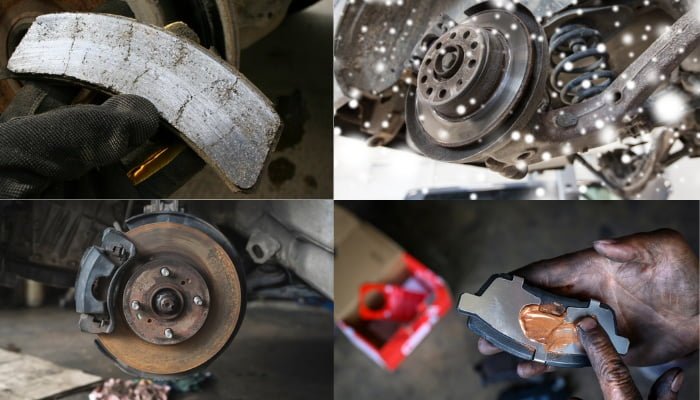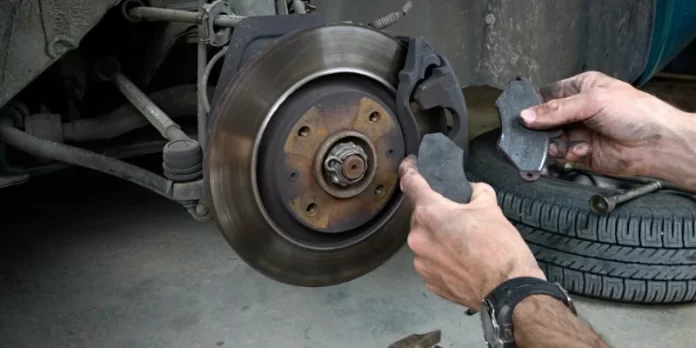Last updated on February 1st, 2024
There are car squeaks that could cause the whole neighborhood to look in awe. Have you been wondering why your car keeps squeaking whenever you’re backing up?
Most times, it could be because of a worn-out brake pad rubbing against the rotor, thereby causing a squeaking noise. In this case, you’ll need to replace the pad with a new one to fix the issue.
We’ll be extensively highlighting the reasons why cars squeak when backing up. At the end of this article, you should be able to proffer a solution to resolve the problem. Let’s begin!
Reasons Why Car Squeaks When Backing Up
The possible reason why your car could be squeaking when reversing is because of a faulty brake.
It doesn’t matter whether the issue is serious or not; you have to attend to the situation promptly. Other issues could be affecting the smooth running of your car. They include:
1. Absence of Anti-rattle Chips
When the anti-rattle chips are no longer in place, your car will likely begin to make noise when you reverse (back up).
2. Worn-out Alternator Whine
This equipment is located under the hood of most cars. When the bearings inside the alternator become worn out, it’ll begin to make squeaking noises.
In some cases, you’ll hear it whining through the stereo. To resolve the issue, you’ll need to replace the bearings of the alternator or buy a new alternator whine.
3. Worn-out Wear Tabs
Sometimes, if your car makes a squeaking noise when backing noise, it could be because of the wear tabs. These tabs are situated at the edge of the brake tabs. When they rub against the rotor, they cause noise.
4. Metals
When two metals friction, they’ll produce noise. For example, if there’s metal in-between the brake pads and a car rotor, it’ll cause a squeaking noise.
5. Worn-out Belt Drive
Normally, the belt drives of a car are built to last for up to 10,000 miles, but, because of how they’re constructed, they stretch and crack as time goes on.
This wearing out will cause them to start making noise. Fortunately, installing a new drive belt is not a herculean task.
6. Grease Shims
Grease shims are one of the major causes why cars squeak when backing up.
7. Bad Pulley Bearings
Once the pulleys are damaged, they’ll start producing high-pitched sounds as the engine is running. Make sure to replace the pulley bearings on any accessories that are worn out.
Some of these accessories are the water pump, power steering pump, and compressor.
8. Vehicle Suspension
Aside from brake squeaks, vehicle suspension also causes squeaking. The parts that squeak are often a result of a lack of lubrication, and metal-to-metal friction, especially in connections like suspension joints, tie rods, and steering linkage.
You can fix this by adding a spray-on lubricant to a grease gun and applying it to the metallic joints. Alternatively, you could take your vehicle to a mechanic’s workshop for servicing (including an oil change).


How to Eliminate Vehicle Suspension Squeaks
Here are some important facts to note when trying to get rid of vehicle suspension squeaks:
Most newer car models have sealed suspension joints that are permanently lubricated. This lube makes it impossible to apply lubricants.
So, when the original lube leaks or degrades, the only available option will be to replace the part (suspension joints).
Some vehicles are manufactured in a way that the owners can lubricate the suspension guns by themselves using a grease gun.
If your car doesn’t have safety equipment, or you don’t know how to go about the lubrication process yourself, it’s best to reach out to an expert.
All cars with front-wheel drive have over a dozen fittings that require consistent lubrication. Always ensure that all the connections (and fittings) are properly lubricated.
The coil or leaf spring in some vehicles also causes squeaks. To fix this fault, you’ll need to use a silicone spray, not grease, because of the plastics in the spring that must stay in place.


Maintenance Tips to Prevent Car Squeaks When Backing Up
Car squeaks generate unpleasant sounds to the ear. It’s best to apply proper maintenance tips to help the car run smoothly when backing up (reversing). See some of the tips below:
Always lubricate both sides of the shims to eliminate any problems with the brake pads. Make sure not to use too much grease, so it doesn’t cause a lump or large build-up.
Install disk brake caliper grease in between the surface of the caliper and the pad abutment. The grease will help keep the brakes lubricated, thereby eliminating any noise.
Replace worn-out anti-rattle chips with new ones to stop the squeaking noise when changing brakes.
Ensure that you regularly clean the brake pads and rotor to prevent any metal object from sticking in between them.


Types of Brake Squeaks
Here are 4 major types of brake squeaks that cause noise.
Indicator squeaks – are caused by worn-out or thinning brake pad adhesive.
Morning squeaks – as a result of dew, moisture, or rain.
Rear drum brake squeaks – caused when the backplate frictions with the shoe. To resolve this, you’ll need to lubricate the contact points.
FAQs
Why Does My Car Squeak When Braking?
There are many reasons why your car squeaks when braking.
Worn-out brake pads
If you’ve used your car for a long period and you’re beginning to hear squeaking noises from the brakes, it’s a sign that you need to replace the bad brake pads.
Rusty brake rotors
From prolonged use, your brake rotors may get rusty. This rust increases the friction between the rotor and the brakes, causing squeaking noises.
In some cases, you may not need to replace the brake rotor, but get rid of the debris and rust by taking your vehicle to an expert auto dealer.
New brake pads
The 3 common types of brake pads are organic, semi-metallic, and ceramic pads. Even though they’re highly effective, they could make squeaking noises too.
Can Brake Dust Cause Squeaking?
The metal particles in-between brake pads can cause your car to squeak when the metal brake rotors rub against themselves. Brake dust accumulates because of the brake function, resulting in squeaking. Regular replacements will eliminate the noise.
Why Do My Brakes Squeak When Backing Up?
The squeaks on the vehicle could be because of moisture on the pads or rotors. Bad shims and dust could also cause your brakes to always squeak. Cracked pads also cause brakes to squeak when backing up.
Final Words
If you’ve been experiencing this squeaking noise when backing up, the maintenance tips mentioned in this article will help you fix the problem.
By applying the tips, you’ll enjoy a better driving experience, and you won’t have issues reversing or backing up.
Most of all, a brake inspection is vital.
Always take your car to your mechanic for servicing periodically, if you can’t do it yourself.



